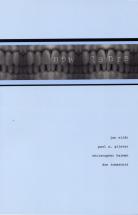“Three Views from Deir el-Medina” by Paul A. Gilster
“The Last to be Found” by Christopher Harman
“Thrown” by Don Tumasonis
While Tangent doesn’t review essays, I think the essay by Adam Golaski, horror fiction editor for New Genre, could be taken in part as a warning to the casual reader of the nature of the work to follow:
“The few of us who still read must learn to really read, not merely consume stories. So many readers ask not to be challenged. They have no wish to do the work that good literature requires.”
So I was warned. And reading “Bink Is Luv” by Jan Wildt did turn out to be a challenge, but one that was worth the effort once I made it past the confusion of a somewhat different method of presentation. Those of you who are into gaming, blogs and chat rooms, who run around with cell phones glued to your ears and participate constantly in electronically-aided communication, might find it less difficult than I did. The story is told as a communication between Bink, an artificial personality whose celebrity has elevated her to a quasi-religious role, and “Herbert,” ostensibly someone trying out the software, but possibly a pseudonym for Randall Zarr, father of Madison Zarr, once a Bink super-fan and now the current physical incarnation of the Bink persona. There are pop-up notes, such as you might experience reading on-screen, except that the connection is obviously more intimate than that and ties in to virtual reality to some extent. Various other disembodied characters chime in from time to time, indicated by different type fonts.
Somehow the story filters through of the shocking death of Madison’s twin sister Monroe, the father’s subsequent nervous breakdown, the divorce of Madison’s parents, her limited relationship with her father, who never fully recovers, and the growing obsession of both father and daughter with Bink. Under all the glitz and glamour and the slick sales tactics, there is still the poignant lament of a lost little girl, suffering from emotional abandonment. “Why won’t you love me? I’ve been a good girl.”
“Three Views from Deir el-Medina” by Paul A. Gilster also plays around with the nature of reality to some extent, but is told in a more straightforward conventional manner. Marion Slade runs the company that is responsible for a major space probe, headed for the stars—if he and his team can track down the programming glitch that threatens to scuttle the project. Marion’s wife, Shelley, has been seriously ill, diagnosed with ALS, her death perhaps imminent—yet now, she is unaccountably getting better, but their marriage may not survive the experience. Marion almost miraculously survives a train wreck that kills a fellow passenger—yet he keeps seeing her, or someone like her, in London. In following the mysterious woman, he’s lead to a restaurant called The Valley of the Kings, whose walls are graced by three photographs taken at Deir el-Medina, which seem in some way to connect to the happenings of Marion’s life.
Something mysterious is happening; many people thought to be terminally ill are recovering. As the story threads weave in and out, we are drawn to contemplate the nature of life and death, and especially the effects on individuals of the journey through the shadow of death to the unknown world lying beyond. As Shelley’s doctor puts it, “Death is mystery enough, … but now we are learning that healing is a greater mystery still.” This is a thought-provoking story, well worth reading.
“The Last to be Found” by Christopher Harman is a deliciously chilling ghost story. Harman does a masterful job of luring us in, encouraging us to identify with the calm and logical Peter Meltish who would like to believe in ghosts (he thinks) but can always explain away supposed manifestations of the supernatural. Somehow, almost imperceptibly, a line is crossed and we find ourselves, with Meltish, drawn into the nightmare world with no exit in sight. A great read in the best classic horror story tradition; I wouldn’t recommend reading it by candlelight on a “dark and stormy night.”
“Thrown” by Don Tumasonis takes us hiking across Crete, where Martin and Marline are having a holiday. Martin is already having problems with his perceptions of reality, has indeed had them all his life. The sky, for instance, doesn’t look right, somehow. Now his feelings intensify, culminating in a startling revelation which I won’t give away; you’ll just have to read it and find out.
